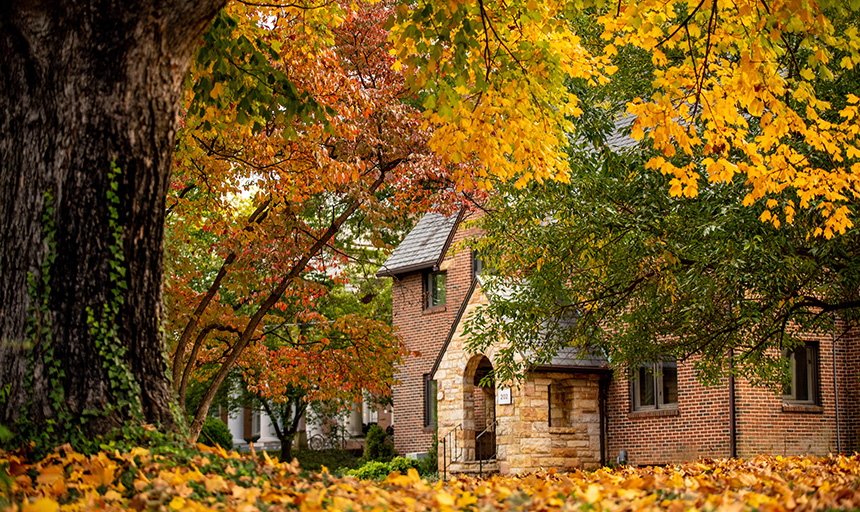In search of PLACE
December 28, 2021

After their time at Roanoke College, every Maroon will have a story to tell — not just about their time on campus, but about themselves.
A student’s story begins as soon as they set foot on campus in Salem, and with the help of career coaches, their narration of it also begins immediately. Through their four years, students will develop their personal narrative through writing prompts and discussions with career coaches.
Dr. Richard Grant, interim vice president for academic affairs and dean of the College, said storytelling is a key way to learn about oneself and develop a purpose-driven outlook on life.
“The final story they'll tell us as part of their senior exit interview is, ‘This is how I find purpose in my life,’” Grant said.
This is just one of the ways that the College’s updated approach to career services is helping to connect students with life purpose and meaning. This fall semester, Roanoke launched a center for Purpose, Life and Career Exploration (PLACE) dedicated to helping students explore lives of meaning and purpose through mentorship, experiential learning opportunities and career preparation.
PLACE is an updated version of Career Services, which for years, helped students develop a resume, connect with internships and job opportunities, and more. PLACE adopts a series of current best practices, incorporating the focus on developing a personal narrative and identifying one’s purpose in life.
Roanoke College already specializes in helping students find purpose, according to a study conducted by Hanover Research. Hanover, an international research firm, polled thousands of people nationwide and determined that more Roanoke alumni (85% of those polled) reported finding meaningful careers than graduates of other colleges (80% of those polled).
Even though career coaches are located in the Fowler House on campus, Grant said students’ search for purpose and meaning “happens everywhere [on campus], not just there,” Grant said.
PLACE is a vital part in the College’s vision for helping students connect with high-value careers and purpose-driven lives.
Getting faculty on the same page with the idea of helping students find purpose has been a key endeavor in recent years. “What’s your purpose?” can be a daunting question for people of all ages, not just students, and having faculty and staff who understand how to translate that idea for students is important.
I don't think there's a singular purpose. That's one thing that we think — that we have one singular purpose in life — and that's not really it.
Dr. Karin Saoub, M. Paul Capp & Constance Whitehead Professor of Mathematics
Dr. Karin Saoub, the M. Paul Capp & Constance Whitehead Professor of Mathematics, is one of the many faculty members who understands that the idea of purpose is multifaceted and changes over time.
“I don’t think there’s a singular purpose,” Saoub said. “That’s one thing that we think — that we have to have a singular purpose in life — and that’s not really it.”
It’s important to remember, Grant said, that even though PLACE physically will be anchored in one location, the work of PLACE will reach every corner of campus. Grant likens PLACE to the hub of a wheel, with spokes reaching out all across campus and connecting students with professors, staff members, jobs, connections, organizations and services all over campus.
Faculty members such as Saoub, who can clearly communicate the meaning of finding purpose, are an important part of the overall vision of PLACE.
“We get people trained and willing, and really interested in having these types of conversations with students,” Grant said. “It's not all going to happen at the PLACE with the staffing there, but we'll connect them to the right people on campus.”
In this way, PLACE will be more integrated into academics than what had been Career Services, Grant said.
Grant has wanted the College’s career services offerings to get what he called “a programmatic facelift” for quite some time. At many colleges and universities, including Roanoke, Career Services often becomes an office that students turn to during their junior or senior years, as they feel the pressure of impending graduation and entrance into the job market, Grant said. By then, sometimes it’s too late to connect students with internships or networking opportunities, he said.
“Really, the whole process of career development needs to begin the moment students step foot on campus,” Grant said.
That’s the aim of PLACE, to provide a service that students will use as soon as they arrive and that they’ll continue to use until they graduate.
Students are not required to use the resources PLACE has to offer, but each PLACE career counselor will have a list of students to reach out to, and every new student will hear from a counselor when they arrive on campus. Through marketing, word of mouth and success stories, Grant and others hope that more and more students take advantage of PLACE.
“We're going to ramp that up further and try to ensure that happens for all students,” Grant said.